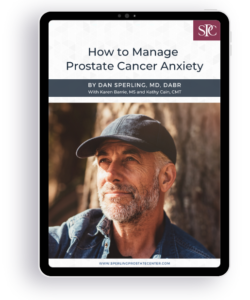Are you newly diagnosed with prostate cancer (PCa) and deciding on a treatment?
Are you on Active Surveillance and monitoring your PCa using biomarkers and MRI?
Have you had a local treatment, either radical or focal, and are doing annual follow-up as instructed?
Do you have advanced PCa controlled by androgen deprivation therapy (ADT)?
Do you have metastatic castration-resistant PCa and are under the care of an oncologist?
While each of the above scenarios has its own unique stressors, there is a right way to live that can enhance chances for survival while boosting your quality of life. It is a promising integration of core factors that have been well-researched, with promising benefits no matter which stage of the PCa journey you’re at. In fact, it’s the right way to live even if you never have cancer. However, for many PCa patients, their cancer becomes a powerful incentive to fulfill lifestyle resolutions that have slipped through the cracks of work and family pressures.
In 2019, a team of authors from three noteworthy academic centers (University of California San Francisco, Columbia University, University of Minnesota) assembled lifestyle recommendations for PCa patients based on data from randomized controlled trials (RTCs) and other studies. Their conclusions, published in 2020 by the peer reviewed journal Urologic Oncology,[i] provide a roadmap to better living with PCa.
Why randomized controlled trials?
First, a word about the importance of high-level research. Each person’s life is like a private science experiment with a study population of one–yourself. We constantly make choices that make us feel good. We unconsciously form a bias that it’s the right thing to do—though it may actually be generating low grade harm over many years. For example, you may be in a high-pressure job that leaves you exhausted by Friday evening. Weekends don’t bring longed-for rest and relaxation, because they involve catching up on domestic chores, errands, and family activities. Collapsing in front of Sunday football while drinking a beer and chowing on BBQ potato chips feels like a well-deserved break. While it may seem like an active, successful life, what’s missing? Being your own research study does not guarantee you have all the information you need on what you’re causing in your own body.
This is where RTCs come in. Experts tell us that “…randomization reduces bias and provides a rigorous tool to examine cause-effect relationships between an intervention and outcome. This is because the act of randomization balances participant characteristics (both observed and unobserved) between the groups allowing attribution of any differences in outcome to the study intervention. This is not possible with any other study design.”[ii] You’ll never find a published study with only a single subject showing that six days of stress alternating with a seventh couch potato day contributes to a long healthy and happy life! In short, you can’t trust what you’re doing to yourself.
Recommended practices based on RTCs
The 2020 article mentioned above was the result of a thorough, rigorous review of evidence from RTCs on lifestyle practices that are demonstrated to benefit PCa practices. The following brief descriptions summarize their findings, but if you’re interested in the specific RTCs cited by the authors, you can find the entire article here:
- Dietary factors – recommended are low-saturated fat, plant-based, whole-food diets such as the Mediterranean diet, while green tea and lycopene/tomato products are beneficial. Further research is needed to validate single-arm studies that suggest there is merit in coffee, cruciferous vegetables, mushrooms, fish, and cutting down on eggs, dairy, poultry with skin, processed red meat, and saturated fat.
- Activities – high intensity aerobic and resistance exercise are most helpful when done as a regular practice; evidence also points to guided imagery/progressive muscle relaxation, Pilates, qigong, and massage. Maintaining healthy BMI (body mass index) through exercise plus diet, and quitting smoking also contribute to positive PCa treatment outcomes.
- Psychological health – Managing stress, anxiety, insomnia, and depression through various interventions is important, since PCa patients with advanced and metastatic disease are especially prone to psychiatric symptoms that can pose obstacles to consistent practice of healthy diet and activities.
PCa and the right way to live
Adhering to healthy diet, physical activities, and stress management practices is good for the body and emotional well-being. Biological studies increasingly confirm the interconnectedness of the mind, heart, gut microbiome, and immune system. Each of us has a desire, whether conscious or not, to be the best selves we can be, and live long and trouble-free lives. There is no single right way to live that works for every person or culture, but lessons from the Blue Zones where people routinely live vigorous, satisfying lives into their 100s also show us the importance of loving relationships, play, purpose and community.
Returning to the idea that each of us is our own science experiment, the evidence is available all around you. Whether you are at risk for PCa, have it, or are recovering from it, listen, learn and research to discover your personal right way to live.
Download Our Free Ebook: “How to Manage Prostate Cancer Anxiety”

Don’t let anxiety over prostate cancer run you. Instead, learn how you can take charge and empower yourself to manage stress and boost positive treatment outcomes with our “first aid kit” of practical tips and tools.
NOTE: This content is solely for purposes of information and does not substitute for diagnostic or medical advice. Talk to your doctor if you are experiencing pelvic pain, or have any other health concerns or questions of a personal medical nature.
References
[i] Zuniga KB, Chan JM, Ryan CJ, Kenfield SA. Diet and lifestyle considerations for patients with prostate cancer. Urol Oncol. 2020 Mar;38(3):105-117. doi: 10.1016/j.urolonc.2019.06.018.
[ii] Hariton E, Locascio JJ. Randomised controlled trials – the gold standard for effectiveness research: Study design: randomised controlled trials. BJOG. 2018 Dec;125(13):1716.


